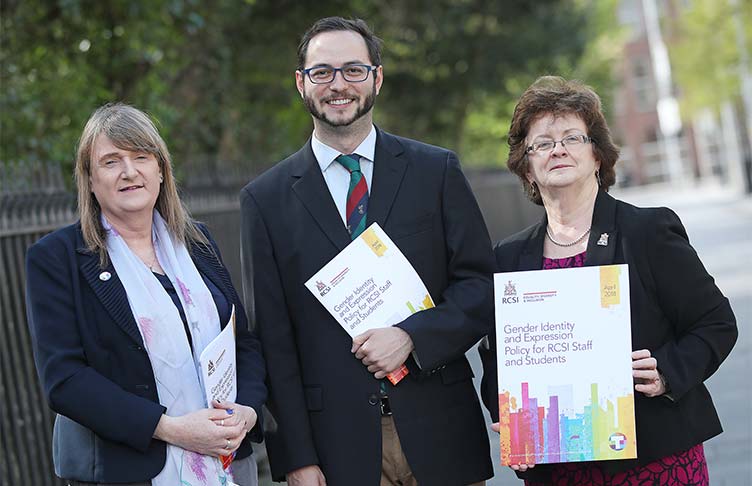RCSI launches gender identity and gender expression policy

The Minister for Employment Affairs and Social Protection, Regina Doherty TD will today launch a comprehensive policy on gender identity and gender expression aimed at students and staff of RCSI. The policy was developed following extensive consultation with faculty and staff.
Minister Doherty today said: "The purpose of this policy is to provide information and guidance to staff, students and alumni, not just for its own sake but to ensure that students and staff feel supported at RCSI and that transphobia is prevented. I am particularly pleased that the policy aims to maximise integration and inclusion, while minimising any experience of stigma, discrimination or harassment."
Speaking ahead of the launch, lead author of the policy Dr Caroline Kelleher said: “In developing this policy, RCSI aims to foster a welcoming and inclusive learning and working environment for students and staff who are trans or gender non-conforming. We also wish to ensure a safe, healthy and comfortable space to develop gender identity and/or gender expression free from fear of discrimination or transphobia.”
Chair of Transgender Equality Network Ireland (TENI) Sara R Phillips said: “The College has taking a leadership role among professional bodies as a welcoming and inclusive place for trans and gender non-conforming people to work and study. The opportunity to fully integrate into college life, free from stigma or fear of exclusion, empowers you trans and gender non-conforming people to pursue meaningful careers in healthcare.”
“TENI was delighted to work so closely with RCSI, both in the development of the policies and in the provision of training to faculty and staff,” she added.
RCSI CEO and Registrar Professor Cathal Kelly said: “Equality, diversity and inclusion are core to our new Strategic Plan 2018 – 2022. We are committed to providing an environment where all staff and students, including trans staff and students, feel supported and included here at RCSI. Over the past two months, over 100 of our front-line staff, as well as our senior management team, have attended Trans 101 training sessions, which is key to helping us effectively implement this policy. We are delighted to partner with TENI on this important initiative.”

Pictured (l-r) at the policy launch were Minister for Employment Affairs and Social Protection, Regina Doherty TD; Professor Hannah McGee, Dean of the Faculty of Medicine and Health Sciences, RCSI; Dr Caroline Kelleher, Lead Author on the policy and Lecturer in Psychology at RCSI; Andrew Cox, RCSI Student and Pride Network Representative; and Sara R Phillips, Chair, Transgender Equality Network Ireland (TENI)
RCSI is ranked among the top 250 (top 2%) of universities worldwide in the Times Higher Education World University Rankings (2018) and its research is ranked first in Ireland for citations. It is an international not-for-profit health sciences institution, with its headquarters in Dublin, focused on education and research to drive improvements in human health worldwide. RCSI is a signatory of the Athena SWAN Charter and, in 2018 the College achieved the Investors in Diversity Award.
Download the Gender Identity and Expression Policy for RCSI Staff and Students.
What the policy covers
- Addresses the needs of transgender and gender non-conforming employees and students and provides clarification on how the law should be implemented in situations where questions may arise about how to protect the legal rights or safety of such employees or students.
- Nonetheless, the needs of each transgender employee/student must be assessed on a case-by-case basis.
- Supports and aligns with many of RCSI’s current policies e.g. Dignity at Work; RCSI Code of Practice for the Employment of People with Disabilities; Code of Conduct for Undergraduate Students 2016-2017; Code of Conduct for Postgraduate Students 17-18; Student Dignity and Respect Policy.
Why RCSI developed the policy
- To ensure the safety, comfort, and healthy development of transgender employees and students while maximising their workplace/educational integration and minimising their experience of any stigma.
- The Employment Equality Acts 1998-2015 and Equal Status Act 2000-2015 prohibit direct and indirect discrimination, sexual harassment, harassment and victimisation in relation to nine equality grounds including gender.
- The gender ground protects transgender persons from sex discrimination, that is, discrimination arising from gender identity and gender expression. Such an approach was approved by the European Courts of Justice in P v S and Cornwall County Council (Case C-13/9) and reaffirmed by the Equality Tribunal in Hannon V First Direct Logistics Limited (DEC-S2011-066).
- The Gender Recognition Act, 2015 provides a process enabling transgender people to achieve full legal recognition of their preferred gender and allows for the acquisition of a new birth certificate that reflects this change. It allows all individuals over the age of 18 to self-declare their own gender identity.



